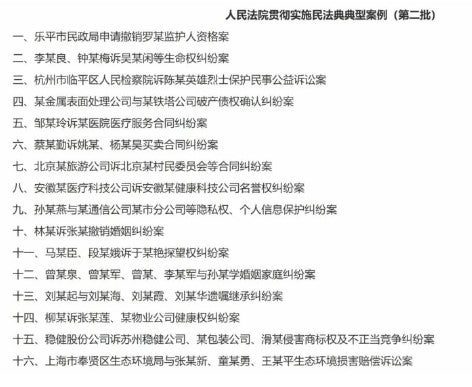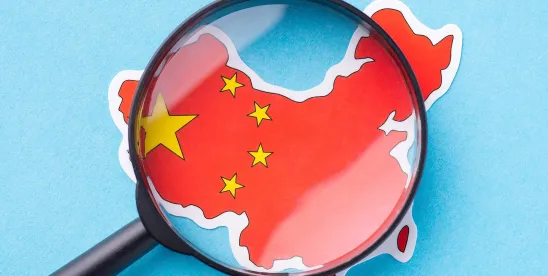January 12, 2023, China’s Supreme People’s Court released the Typical Cases of People’s Courts Implementing the Civil Code (Second Batch) (人民法院贯彻实施民法典典型案例(第二批)). The Second Batch comprises 16 cases including one intellectual property case: Wenjian Co., Ltd. v. Suzhou Wenjian Company, a packaging company and Hua, personally (dispute over trademark infringement and unfair competition). In this case, the Court “pierced the corporate veil” in effect by holding Hua jointly and severally liable with the companies as he was the controlling shareholder and mixed business and personal funds.

As explained by the Supreme People’s Court:
15. Wenjian Co., Ltd. v. Suzhou Wenjian Co., a Packaging Company, and Hua (dispute over trademark infringement and unfair competition)
(1) Significance
The Outline of the Program for the Building of a Powerful Intellectual Property Nation (2021-2035) proposes to build an intellectual property protection system that supports an international first-class business environment. The judicial protection of intellectual property rights, as an important force of the intellectual property protection system, plays an indispensable and important role. This case is a typical case where the people’s court protects the rights and interests of enterprises’ trade names and trademarks according to the law and serves to guarantee the prevention and control of the epidemic situation and economic and social development. In this case, Wenjian Co. was a well known medical hygiene materials production enterprise with a relatively high reputation in the industry in terms of trademark and enterprise name. The infringer deliberately registered enterprises using the Wenjian name, produced and sold mask products, and conducted serious trademark infringement and unfair competition acts. In response, in its judgment, the trial court imposed severe punishment through the application of punitive damages, enhancement of compensation, determination of joint infringement, and order of cessation of use of the trade name. The judgment has effectively protected the intellectual property rights and related rights of right holders, interpreted the basic concept of the people’s court’s comprehensively strengthening of judicial protection of intellectual property rights and maintained a fair competition order, and integrated political effects, legal effects, and social effects.
(2) Basic Facts
Established in 2000, Wenjian Co., Ltd. produces medical dressings, surgical consumables, medical hygiene materials and home hygiene products. It has registered trademarks such as

on many products, including masks. Wenjian has a relatively high reputation and influence in the industry, and has made significant contribution to the epidemic prevention and control in China. Founded in 2020, Suzhou Wenjian Medical Products Co., Ltd. used [similar marks] to advertise products, companies and businesses. Hua held 99% and 91.6667% shares in Suzhou Wenjian Company and a packaging company, respectively. The office address of Suzhou Wenjian Co., Ltd. was located in a packaging industrial park. The official website address of a packaging company was indicated on the packaging bags of face masks sold by the company, and the sales receipts issued by the company were affixed with the official seal of the packaging company. The packaging company’s website devoted a large part to product and enterprise information of Suzhou Wenjian Company. Its online shop sold Suzhou Wenjian Company masks, and called itself a “self-owned factory” and “source manufacturer.” Hua included the income from the online sale of masks from the packaging company in his personal account. Wenjian Co., Ltd. argued that the aforesaid act infringed upon its trademark right and constituted unfair competition, and the packaging company and Hua jointly infringed upon the trademark. Therefore, Wenjian Co., Ltd. demanded that Suzhou Wenjian cease the infringement and compensate for losses, and that the packaging company and Hua should assume joint and several liability.
(3) Judgment
The effective judgment held that the registered trademark and enterprise trade name involved in this case had relatively high popularity. Suzhou Wenjian Company used logos identical with or similar to the registered trademark in question on mask products and the company’s website, online stores, and public social media accounts and registered and used the trade name “Wenjian” and enterprise name without authorization, and carried out identical business activities. It was obviously for the purpose of freeriding off the goodwill of Wenjian, causing confusion and misrecognition, and constituted trademark infringement and unfair competition. Suzhou Wenjian Co., Ltd. and the packaging company were closely related, and Hua was the absolute controlling shareholder of the two companies. Personal property was mixed with company property. Under the planning and control of Hua, the two companies divided their work and cooperated with each other to jointly commit the infringement, and the three parties shall assume joint and several liability. Suzhou Wenjian Co., Ltd., the packaging company, and Hua, knowing that the trademark and trade name involved in the case were well known in the industry and using a registered company with an infringing trade name, conducted the aforesaid acts in an organized manner, continued the infringing acts after being warned twice by Wenjian, and made false statements to the market regulatory authority, which seriously violated the principle of good faith and business ethics. At the same time, the infringing goods in this case were materials for epidemic prevention and control, which had low prices, and were sold to the public without undergoing the formal inspection procedures. The quality was of potential concern, which caused great damage to the goodwill of Wenjian, seriously endangered the health of the public, and adversely affected the work of epidemic prevention and control. The channels for infringement in this case were various, including online website, online stores, and offline sales, and such apps as WeChat, Douyin, Taobao and 1688. In addition, the scale of infringement was large and the time span was long, and the parties refused to submit financial account books and other evidence as required by the court. Therefore, the Court held that the infringing circumstances of Suzhou Wenjian Company, the Packaging Company and Hua Company were serious and obviously intentional, and that punitive damages of four times should be applied to the part of profits from the ascertained infringement; and that the statutory compensation should be applied to the part of damages for which the specific sales volume could not be ascertained after the serious infringement had been taken into consideration. Therefore, the Court ordered Suzhou Wenjian Company, the packaging company and Hua immediately cease their acts of infringing upon the right to the exclusive use of a trademark and unfair competition; Suzhou Wenjian Company immediately ceased its use of an existing enterprise name, and the three parties jointly compensated 1,021,655 RMB for losses and reasonable costs of rights protection of Wenjian Co., Ltd.
(4) The Guidance to the Articles of the Civil Code
Article 179 The main forms of civil liability include: (1) cessation of the infringement; (2) removal of the nuisance; (3) elimination of the danger; (4) restitution; (5) restoration; (6) repair, redoing or replacement; (7) continuance of performance; (8) compensation for losses; (9) payment of liquidated damages; (10) elimination of adverse effects and rehabilitation of reputation; and (11) extension of apologies. Where punitive damages are provided by law, such provisions shall be followed. The forms of civil liability provided in this Article may be applied separately or concurrently.
Article 1168 Where two or more persons jointly commit a tortious act causing damage to another person, they shall bear joint and several liability.
The original announcement from the Supreme People’s Court is available here (Chinese only).



 />i
/>i
